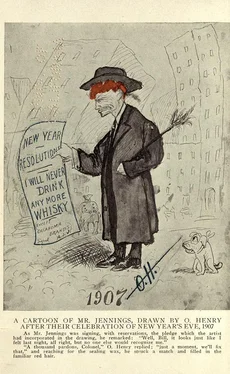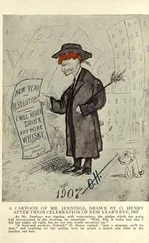Al Jennings - Through the Shadows with O'Henry
Здесь есть возможность читать онлайн «Al Jennings - Through the Shadows with O'Henry» весь текст электронной книги совершенно бесплатно (целиком полную версию без сокращений). В некоторых случаях можно слушать аудио, скачать через торрент в формате fb2 и присутствует краткое содержание. Жанр: Биографии и Мемуары, на английском языке. Описание произведения, (предисловие) а так же отзывы посетителей доступны на портале библиотеки ЛибКат.
- Название:Through the Shadows with O'Henry
- Автор:
- Жанр:
- Год:неизвестен
- ISBN:нет данных
- Рейтинг книги:5 / 5. Голосов: 1
-
Избранное:Добавить в избранное
- Отзывы:
-
Ваша оценка:
- 100
- 1
- 2
- 3
- 4
- 5
Through the Shadows with O'Henry: краткое содержание, описание и аннотация
Предлагаем к чтению аннотацию, описание, краткое содержание или предисловие (зависит от того, что написал сам автор книги «Through the Shadows with O'Henry»). Если вы не нашли необходимую информацию о книге — напишите в комментариях, мы постараемся отыскать её.
Through the Shadows with O'Henry — читать онлайн бесплатно полную книгу (весь текст) целиком
Ниже представлен текст книги, разбитый по страницам. Система сохранения места последней прочитанной страницы, позволяет с удобством читать онлайн бесплатно книгу «Through the Shadows with O'Henry», без необходимости каждый раз заново искать на чём Вы остановились. Поставьте закладку, и сможете в любой момент перейти на страницу, на которой закончили чтение.
Интервал:
Закладка:
The diamond robber said nothing. Restless curiosity sent its questions and suppositions across the "grapevine route" from one cell block to another.
"Who had told?" "What would happen?"
The answer came in a sudden viciousness that revealed the whole betrayal. The robber sneaked one day down the corridor. He had a bottle in his hand. He had calculated his time. He fell into line just as the editor was going to his cell.
There was a frenzied scream, a moment's scuffle, a loud, prolonged, tormented cry. The editor lay on the corridor floor, one eye burned out and his face puffed and flaming with the carbolic acid that was eating into his flesh. When he came out from the hospital he was half blinded and his face, such a seamy mass of ugly scars, hell itself wouldn't own him. He had won the confidence of the diamond-thief and betrayed him.
"Seventy-five" was the punishment ordered for the robber for the assault on a fellow prisoner. He was a tall, slender fellow, graceful and muscular—made like a white marble statue.
Prison is not the place for dark dealings. Every convict knew in less than an hour that the robber was to "get his." I walked out from the transfer office and looked down the stairs into the basement. The robber, strapped across the trough, his ankles drawn under it, his arms across the top, was already a mass of blood.
He uttered not the slightest moan. None but a hell hound—and that's what a guard becomes when he has done a thing like this a hundred times—could have laid those heavy paddles, with their edges sharp as razor blades, across that raw and jagged flesh. The robber was beaten to the bone. Long after he was unconscious, the merciless flaying went on.
The guards stopped. Half an hour passed. The robber came to. The guards propped him up. The deputy warden glowered over him.
"Now say that you are sorry. Say that you'll obey the rules," he thundered.
The mangled, bleeding victim, who couldn't stand, couldn't speak, raised a gray, death-stricken face. And after a long pause, a husky curse came from his lips.
" ----------him, I wish I got his other eye."
They strapped him back to the trough and hacked him to death. Broken bones, ragged flesh, they struck into it until it doubled a limp mass into the trough.
That's what "seventy-five" meant in the Ohio penitentiary in 1899.
They called me a man-killer. I never murdered a man in my life. I shot quick and clean in self-defense. I would have felt myself a degraded beast to have foully killed like that.
If that warden had carried out his sentence, he would have died like a cur. He knew it.
I was reduced to the fourth grade, given a suit of white with black stripes running horizontally across it, put in with the lockstep gang and sent to the bolt contract to work.
The confinement, the isolation, the cruel discipline took the spirit out of me. I heard from no one. No one was allowed to see me. Papers, books, visitors were denied me.
And then I faked sick just to get a word to Porter.
The "croaker" was taking my temperature. Bill came out of the prescription-room; he was not allowed to speak to me. His look was enough. Bitter, sad, troubled. He nodded to me and turned his back. I knew that Bill had tried and failed. He was powerless to help me.
I went back to the bolt works. This is the hardest labor in the prison. Outside contractors pay the State about 30 cents a day for the hire of the men. If a given task is not finished on time the convict is sent to the hole for punishment. Twice in three days "Little Jim," a negro, was given the "water."
A hose with a nozzle, one-quarter of an inch in diameter, sixty pounds pressure behind it, sends a stream of terrific force at the prisoner. His head is held strapped, the stream that is hard as steel is turned full in the man's face, his eyes, his nostrils. The pressure compels him to open his mouth. The swift, battering deluge tears down his throat and rips his stomach in two. No man can stand the "water" twice and live.
Little Jim passed my bench one morning.
"Mr. Al, they done give Lil Jim the water ag'in," he whispered, walked a step, flopped to the ground, a red geyser spouting from his mouth. Before Little Jim reached the hospital he was dead.
After that morning, I was about finished. I lost all hope, all ambition. Bill Porter saved me.
Across the grapevine route he sent his message. From one convict to another the word went until it was stealthily whispered in my ear:
"Don't lose heart. I'm working. There's a new main finger."
CHAPTER XVI.
The new main finger; a tuba solo; failure at prayer; transfer to the post-office; literary ambition; O. Henry writes a story.
The new "main finger" meant a new warden and an entire change of administration. A shift like this sent the prison into feverish, suppressed excitement.
I was working at the bolt contract. A patrol guard glided to my bench in the shop and silently beckoned to me. There is something mischievously sinister in the hushed voices and the noiseless tread of men in prison. Without a word, without even knowing where I was going, I followed.
I was taken out of the fourth grade when I arrived at the State shop.
"Think you could play a tuba solo Sunday?" the guard asked. "You're going back to your place in the band."
Musicians are scarce enough in prison. I had been one of the dominant notes in the band before I was thrown into solitary.
Sunday the new warden was to publicly take office. Several hundred visitors would be present. The warden would make his speech to the 1,700 convicts. The prison band would furnish entertainment.
As I passed through the chaplain's office into the library, where the band, met before going to the rostrum, Bill Porter stood at the door. Quite dignified as always, but his face set, almost despondent, Porter greeted me.
"Colonel, you are looking better. Thank God they needed the tuba solo." He lowered the tone that was always hesitant and whispering. "I think, pardner, you are in a religious fervor. There is a vacancy in the chaplain's office. Do you think you could pray?"
I don't know whether I was happier at the prospect of leaving the bolt shop or in the assurance that Porter had won me back in the band and was as loyal to me as I would have been to him.
"Pray I Hell, yes, Bill. Sure I can pray if it will get me off the contract."
How many prayers we offered just to get us "off the contract." Porter smiled.
"Never think that I forget you, colonel. Believe me, that my thoughts were with you every time a poor, outraged devil sent his screams up from the basement."
I looked at Porter, surprised at the tense emotion in his voice. His lips quivered and a sort of gray blight seemed spreading over his face.
"I can't drag out much longer," he said.
It was one of the few times that Porter ever voiced his loathing of the prison system of punishments, and yet he knew perhaps more of its ghastly outrages than any other convict.
Porter had already been night clerk at the hospital for a year and a half. He saw the broken bodies brought up from the basement when men were all but done to death in vicious floggings, in the water and in the hangings. He saw the doctors work over these tortured wrecks, and heal them just so that they could be further tormented.
And when some bitter wretch, driven desperate and insane, would attempt suicide in his cell, Porter was always forced to accompany the prison doctor and aid him to revive the convict. These attempted suicides were almost a nightly occurrence. Often they succeeded.
Comparatively easy as a place in the hospital was, no toil could have corroded into the heart of a man of Porter's temperament as did this unabating contact with misery.
Читать дальшеИнтервал:
Закладка:
Похожие книги на «Through the Shadows with O'Henry»
Представляем Вашему вниманию похожие книги на «Through the Shadows with O'Henry» списком для выбора. Мы отобрали схожую по названию и смыслу литературу в надежде предоставить читателям больше вариантов отыскать новые, интересные, ещё непрочитанные произведения.
Обсуждение, отзывы о книге «Through the Shadows with O'Henry» и просто собственные мнения читателей. Оставьте ваши комментарии, напишите, что Вы думаете о произведении, его смысле или главных героях. Укажите что конкретно понравилось, а что нет, и почему Вы так считаете.











